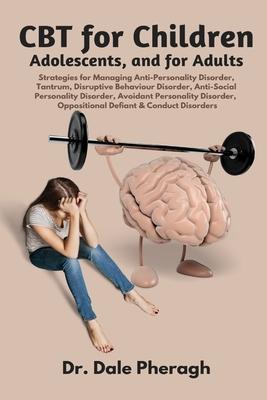The CBT guide for Children and Adolescents gives you the resources to help the children in your life handle their daily obstacles with ease.
Inside this workbook you'll find hundreds of worksheets, exercises, and activities to help treat:
- Ideal Solution for Anti-Personality Disorder
- Tantrum,
- Disruptive Behaviour Disorder,
- Anti-Social Personality Disorder,
- Avoidant Personality Disorder,
- Oppositional Defiant Disorder & Conduct Disorders
- Conduct Disorders
Written by a doctor with decades of experience working with kids, teens, adults and these practical and easy-to-use therapy tools are vital to teaching people how to cope with and overcome their deepest struggles. Step-by-step, you'll see how the best strategies from cognitive behavioral therapy are adapted for children.
Conduct disorder, sometimes diagnosed in child years, that is seen as antisocial actions which violate the privileges of others and age-appropriate sociable standards and guidelines. Antisocial behaviors can include irresponsibility, delinquent acts (such as truancy or operating away), breaking the rights of others (such as robbery), and physical hostility toward pets or others (such as assault or rape). These behaviors sometimes happen collectively; however, one or several might occur with no other(s).
Conduct Disorder is a significant behavioral and emotional disorder that may appear in children and teenagers. A kid with this disorder may screen the design of disruptive and violent behavior and also have problems following guidelines.
It isn't uncommon for children and teenagers to have behavior-related problems sometime throughout their development. However, the behavior is known as to be always a Conduct Disorder when it's long-lasting, so when it violates the privileges of others, it will go against accepted norms of behavior and disrupt the child's or families' everyday living.
A definitive guide to recognizing what factors cause defiant episodes in children, adolescents, & adults and tips to help identify when and where these problematic behaviors are likely to occur. Containing tools to increase positive behaviors, this is an ideal resource for therapists, educators and parents.
- Non-medication approaches to ODD, ADHD, anxiety, mood and disruptive disorders
- Exercises, assessments, guidelines and case studies
- Crisis Prevention and Intervention
- Safety Plans and Risk Evaluations
- Evaluate and Treat Co-morbidity
Tools and Strategies for:
- Noncompliance
- Nagging
- Yelling/screaming
- Bullying
- Panic/anxiety reactions
- Lack of follow-through
- Running away
- Tantrum.
